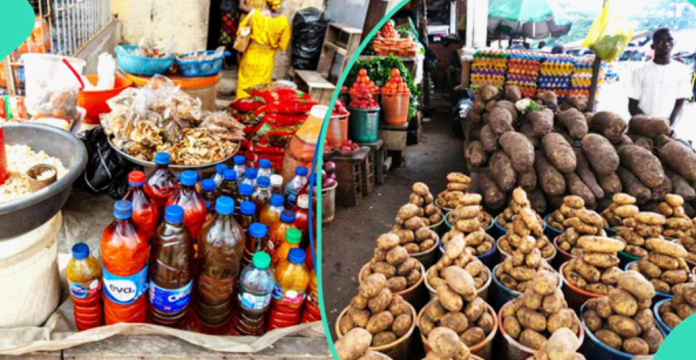it was previously stated that anything that rises in this part of the world never comes down. But all of a sudden, things are changing fast, and the reverse is becoming the case in our markets. A visit to the markets shows that the prices of most commodities are changing for the better, and the citizens are happy.
According to the Nigeria Bureau of Statistics (NBS), Nigeria’s inflation rate dropped to 21.12 per cent in August 2025, with prices of potatoes, yams, onions, fish, and garri, among other things, on the decrease.
Also, food prices in Nigeria’s markets have been fluctuating, with some staples experiencing marginal reductions while others see sharp decreases. For example, a 50kg bag of rice costs between N75,000, N80,000, N110,000, and N120,000, depending on the type, while some market prices of imported long grain rice sell a 25kg bag for N78,000, depending on the brand.
Meanwhile, a bucket of ‘Oloyin’ brown beans now sells for between N4,700 and N5,000, and the white beans sell for N4,300 as against the former price of the last few months of N8,000 and N10,000, respectively.
Garri is not left out of the price reduction. A bucket now costs between N1,600 and N1,700, depending on the colour, as against the former price of N3,000. A tuber of yam now costs between N700 N1, 000, N1, 500 N2, 000 and N3, 000, respectively. Onions, tomatoes, and crayfish, among others, have their varying prices according to season and quality.
Lifestyle talked to a section of society about the market trends. They attributed the price fluctuations to poor road network, rising logistics costs, seasonal scarcity and currency depreciation, weak purchasing power and fragile supply chains.
A trader at the popular Ogbeogonogo Market in Asaba, the Delta State Capital, Mrs Udoka Fumnanya, said bluntly that the problem of food prices and other things is the high cost of fuel, adding that until the government brings down the price of fuel, things will not be normal in this country because the prices of fuel control almost everything.
She said to further reduce food prices in the country, the government can consider regulating prices of commodities, but quickly said that it would not be easy because it is not easy to regulate what you do not have, adding that “it is like house rent. That is why the government is finding it difficult to regulate house rents”. She also suggested that the government should increase agricultural production, as this would drastically reduce the prices of food.
Other strategies she suggested include support to farmers, food storage, as she observed that a lot of food is wasted during harvest because there are no means of preserving it well for a longer time, adding that the government should look into the high cost of transportation.
Mrs Udoka said the gain the traders would have made is swallowed up by high transportation costs due to the high cost of fuel. She opined that if the government can find a way out of the fuel Wahala, things would normalise and the masses can breathe.
A retired civil servant, who is now a farmer, Mr Benerd Okafor, listed some factors that caused the food inflation. According to him, the factors include fuel price hikes, poor agricultural productivity, insecurity and conflicts, climate change and inadequate infrastructure.
He noted that to prevent future food inflation, the government should improve agricultural productivity and enhance security, because many farmers are no longer going to their farms because of insecurity, and this is adversely affecting food security.
He also talked about diversifying the economy and trying to promote self-sufficiency, adding that this can only be achieved by enhancing agricultural yield and encouraging the youth to go into farming.
He further noted that in Nigeria, food inflation has been a persistent issue with prices rising significantly in recent years, and it is good news that the prices of most of the commodities are going down, just as he urged the government to keep it up, warning that if the government relaxes, the food inflation would bounce back in more severe conditions with consequences.
A housewife, Mrs Comfort Ulasi, lauded the government for bringing down the prices of foodstuffs and other commodities and urged them to continue in the spirit. She said that ‘’the citizens of this country need more because they voted for good governance and so should be able to reap the dividends of democracy.’’
She expressed hope that ‘’if the government continues like this, the future elections would be a smooth sail for them’’, adding that if the people are hungry, nobody will vote for any politician.
With smiles all over her face, she said that women can now easily go to the market because of the low prices of food items, adding that, hitherto, a lot of women were afraid to go to the market because of the high prices of goods and services.
She asked, “Do you know that markets were becoming no-go areas for some women, but now they feel safer to go to any market’’, just as she stressed that the government can do more.


